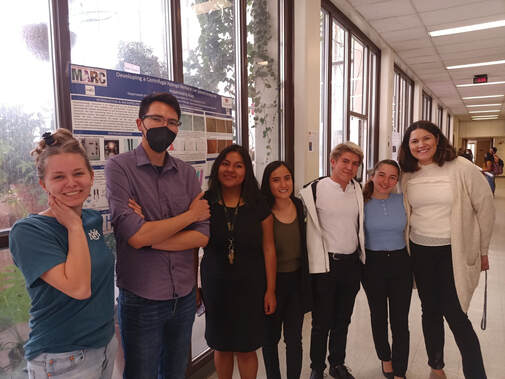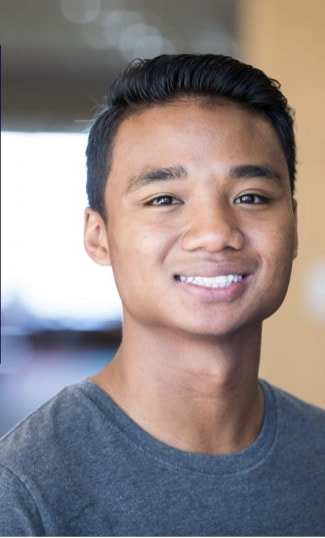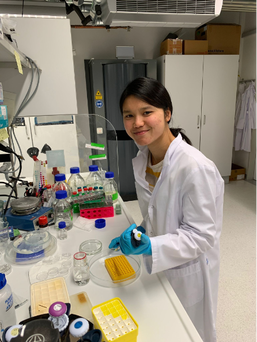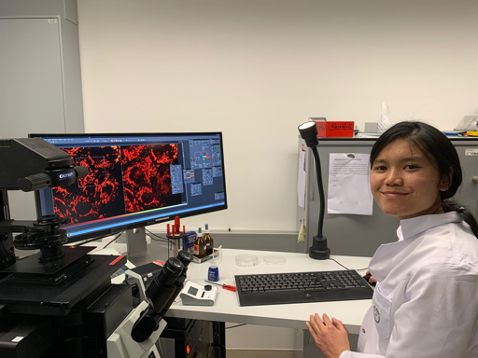
UNM Biology’s U-RISE Program has helped 87% of participating scholars enroll in doctoral programs after graduating over the last 5 years.
10% of our U-RISE scholar earn pre-doctoral fellowships.
Many U-RISE scholars achieve publications. See a collection of their publications here.
Some programs recent U-RISE graduates matriculated into include:
Look at past student’s stories to see how UNM U-RISE can help you start your career!
10% of our U-RISE scholar earn pre-doctoral fellowships.
Many U-RISE scholars achieve publications. See a collection of their publications here.
Some programs recent U-RISE graduates matriculated into include:
- John’s Hopkins University
- University of Colorado Denver
- University of Minnesota
- Michigan State
- Duke University
- Max Planck Institute
- And more!
Look at past student’s stories to see how UNM U-RISE can help you start your career!
Gavin
While at UNM, I was advised by Dr. Marek Osiński, and in his lab, I synthesized and characterized ZnTe-core quantum dots. I was able to work with the Research Engineering Apprenticeship Program and attend various conferences such as SPIE and SACNAS. Also, I had the opportunity to present my research at the Max Planck Matter to Life Symposium in Germany, which was an amazing experience to learn about new research from international speakers.
For my summer research experience, I spent the summer at Duke University as a fellow of the Summer Research Opportunity Program and worked on optimizing hydrogels to grow cells from the meniscus with Dr. Amy McNulty. My summer research experience was a great opportunity to experience new research, learn more about grad school, meet new friends, and network with professors at Duke in the Department of Biomedical Engineering. The MARC program connected me to other smart students who were interested in pursuing graduate school to become better researchers, which was valuable for my professional development and a great support network.
Since leaving UNM, I completed a three-month summer internship at Draper Laboratory where I helped develop a heart valve replacement for children, as a part of the GEM Consortium Fellowship. I am currently a PhD candidate at Duke University in the Department of Biomedical Engineering with Drs. Shyni Varghese and Stefan Zauscher, and I am an NSF GRFP fellow and Sloan Scholar. I am researching a boundary lubricating viscosupplement for the knee joint which can be used to reduce cartilage wear and promote cartilage health in the knee. I am also developing a device to model knee joint to understand the role that mechanical motions have in cartilage health. The MARC program was extremely useful for preparing me for these experiences because it exposed me to interdisciplinary research and trained me to speak and write about my research.
For my summer research experience, I spent the summer at Duke University as a fellow of the Summer Research Opportunity Program and worked on optimizing hydrogels to grow cells from the meniscus with Dr. Amy McNulty. My summer research experience was a great opportunity to experience new research, learn more about grad school, meet new friends, and network with professors at Duke in the Department of Biomedical Engineering. The MARC program connected me to other smart students who were interested in pursuing graduate school to become better researchers, which was valuable for my professional development and a great support network.
Since leaving UNM, I completed a three-month summer internship at Draper Laboratory where I helped develop a heart valve replacement for children, as a part of the GEM Consortium Fellowship. I am currently a PhD candidate at Duke University in the Department of Biomedical Engineering with Drs. Shyni Varghese and Stefan Zauscher, and I am an NSF GRFP fellow and Sloan Scholar. I am researching a boundary lubricating viscosupplement for the knee joint which can be used to reduce cartilage wear and promote cartilage health in the knee. I am also developing a device to model knee joint to understand the role that mechanical motions have in cartilage health. The MARC program was extremely useful for preparing me for these experiences because it exposed me to interdisciplinary research and trained me to speak and write about my research.
Darnell

Darnell worked in the lab of Dr. Heather Canavan in the Department of Chemical and Biological Engineering. Working alongside Dr. Phuong Nguyen, a former graduate student in the Canavan lab, Darnell focused on the development of pH-responsive hydrogels as an alternative delivery system for colonoscopy preparation. My favorite memory of being in the MARC program was the strong community we built amongst the directors and fellow students. I truly felt as though we were a family, and I was always so excited to see everyone whether it was a brief hello in the office or a night for dinner at Bravo!
The accomplishment I was most proud of during my time in the MARC program was being invited to the Max Planck Institute Matter to Life Seminar in Bavaria, Germany with other university faculty, MARC- and IMSD-students. It was such an honor to represent the University of New Mexico at an international seminar and give a talk to scientist from across the world!
Since leaving the University of New Mexico in Spring of 2019, I matriculated into the University of California, San Francisco (UCSF)'s dual-degree Doctor of Dental Surgery & Oral Craniofacial Sciences PhD (DDS/PhD) program Fall 2019. Since joining the program, I am most proud of earning a NIH-funded predoctoral fellowship (F30) that will support me during my training of becoming a dentist-scientist.
The accomplishment I was most proud of during my time in the MARC program was being invited to the Max Planck Institute Matter to Life Seminar in Bavaria, Germany with other university faculty, MARC- and IMSD-students. It was such an honor to represent the University of New Mexico at an international seminar and give a talk to scientist from across the world!
Since leaving the University of New Mexico in Spring of 2019, I matriculated into the University of California, San Francisco (UCSF)'s dual-degree Doctor of Dental Surgery & Oral Craniofacial Sciences PhD (DDS/PhD) program Fall 2019. Since joining the program, I am most proud of earning a NIH-funded predoctoral fellowship (F30) that will support me during my training of becoming a dentist-scientist.
Ayşe

As a MARC scholar Ayse worked in Jeffrey Brinker’s lab on nanotherapeutics. For her summer research experience Ayse travelled to MIT where she worked in Kristala Prather’s lab. After graduating from UNM she matriculated to the University of Michigan to work in Joerg Lahann’s lab. Her dissertation focused on engineering extracellular matrix platforms for disease modelling. Ayse now works in industry as an associate scientist at Flagship Pioneering. Check out her Bio here.
Justine

During my time at UNM, I worked in Prof. Dr. Diane Lidke’s lab and was closely supervised by both Prof. Lidke and my direct supervisor, Dr. Carolina Franco Nitta. I investigated a family of protein-receptors, epidermal growth factor receptor (EGFR), which are known to be over-expressed in cancer patients. Here, I mainly investigated EGFR and its interactions with immuno-fluorescence microscopy. This led to a publication on which I am a co-author. This was an important and formative period, as it was my first exposure to rigorous science. Coupled with the MARC directors’ guidance, I learned so much about how science is conducted, how to pursue a scientific career, and how to professionally network. The most life-changing event in my life so far occurred with a meeting coordinated by MARC, where I met Prof. Dr. Michael Grunze, who was recruiting for a new graduate program in Germany. This led to me and a few other MARC students presenting at a conference in Germany during our senior year. Ultimately this trip, along with my interests cultivated while in the Lidke lab and the MARC program, convinced me to pursue a Master-to-PhD program at the Max Planck School Matter to Life in Germany.
Without MARC, I would have never thought or dreamed of studying internationally. The microscopy techniques that I learned along with the professional development gained from MARC, helped me land a Masters student position with Prof. Dr. Stefan Hell, who won the Nobel prize for developing super-resolution microscopy. Here, I focused on method development, instead of biological investigations. Recently, I have finished my Master thesis in his department, and am currently applying for PhD positions. I am grateful for experience I have gained in the MARC program, and am looking forward to the future.
Without MARC, I would have never thought or dreamed of studying internationally. The microscopy techniques that I learned along with the professional development gained from MARC, helped me land a Masters student position with Prof. Dr. Stefan Hell, who won the Nobel prize for developing super-resolution microscopy. Here, I focused on method development, instead of biological investigations. Recently, I have finished my Master thesis in his department, and am currently applying for PhD positions. I am grateful for experience I have gained in the MARC program, and am looking forward to the future.
